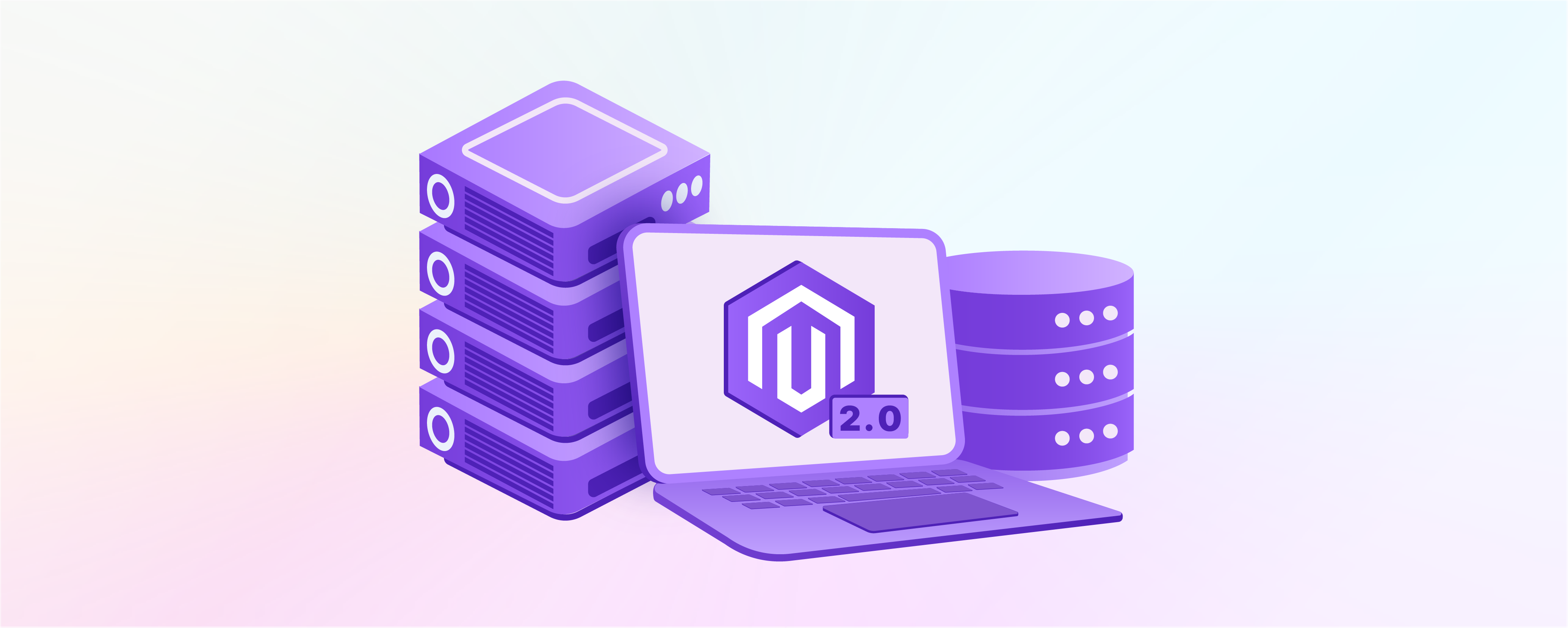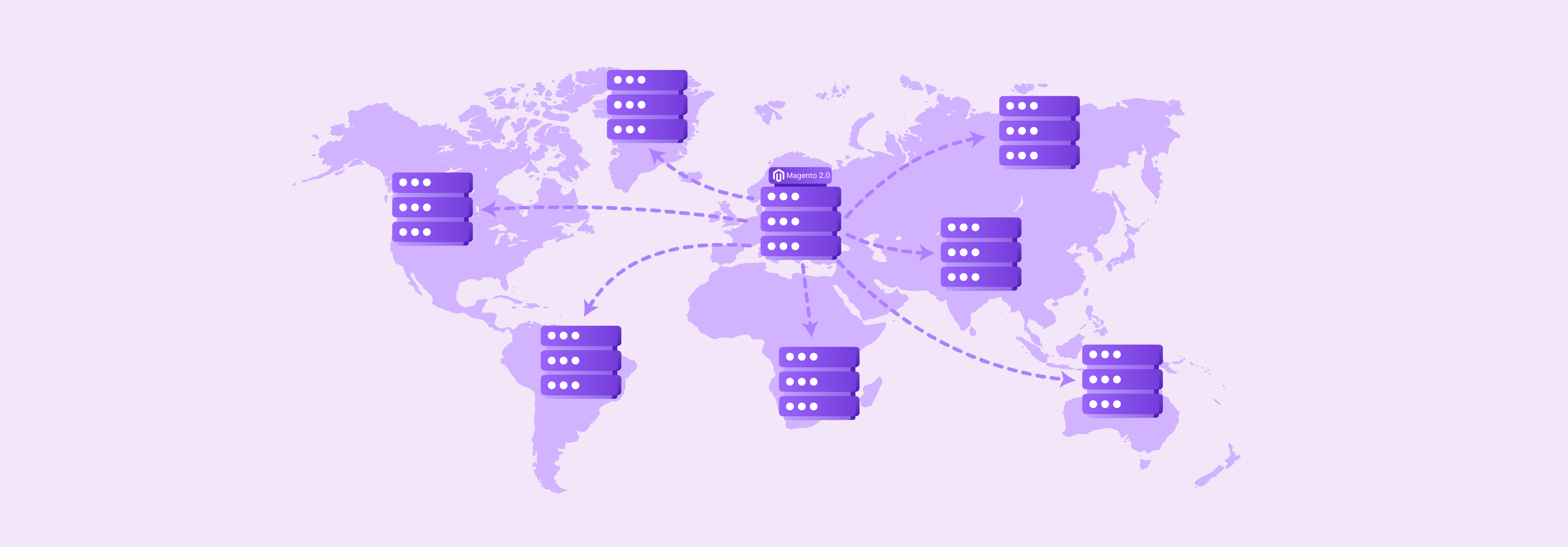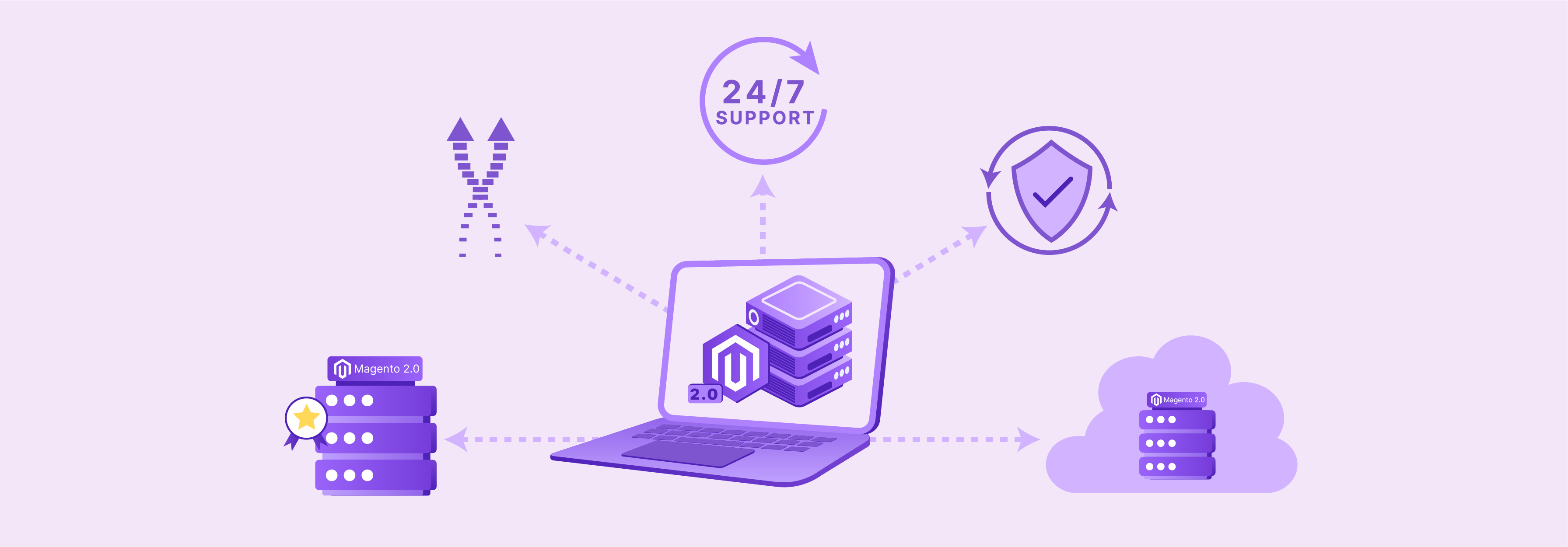
Magento 2.0 Hosting: Key Insights & Best Practices
Magento 2.0 hosting offers many enhancements over Magento 1. It is a more advanced solution for creating and managing online stores. It includes improved performance, scalability, and user experience to cater to various business needs. This blog will cover all aspects of hosting for Magento 2.0. It will include the different hosting options and key factors to consider when choosing a hosting provider. It will also highlight the best practices for optimizing your Magento 2.0 hosting environment.
Key Takeaways
-
Explore Magento 2.0 Hosting tailored for ecommerce for optimal performance, security, and scalability.
-
Learn about shared, VPS, dedicated, and cloud hosting, catering to different needs and budgets.
-
Understand key Magento 2 hosting features such as optimized servers, fast web servers, SSD storage, etc.
-
Implement server configuration, performance optimization, and monitoring for a reliable Magento 2.0 hosting solution.
-
Consider factors like server location, auto-scaling, SSL certificates, and 24/7 expert support for a powerful hosting solution.
What is Magento 2.0 Hosting?
Magento 2.0 hosting refers to web hosting that is optimized and configured specifically for running Magento 2 ecommerce websites. It involves selecting a suitable hosting provider and planning to ensure optimal performance, security, and scalability for your Magento 2.0 store.
Hosting providers offer various hosting options, including shared hosting, VPS hosting, dedicated servers, and cloud hosting. When choosing a Magento 2.0 hosting provider, ensure it accommodates your growing business needs and addresses any issues or concerns.
Magento 2.0 hosting ensures a stable and reliable online presence. It provides an optimal shopping experience for customers while supporting business growth and success.
Different Magento 2.0 hosting Options
1. Shared Hosting
-
Entry-Level Option: Shared hosting involves sharing a server with multiple websites, making it an entry-level and budget-friendly choice.
-
Providers: Companies like SiteGround and Bluehost offer shared hosting plans optimized for Magento 2.0.
-
Resource Limitations: Shared hosting typically comes with limited resources and may not be suitable for high-traffic stores.
-
Pricing: Pricing for shared hosting plans typically starts around $2-50 per month, making it an affordable option for small businesses and startups.
2. VPS Hosting
-
Dedicated Resources: VPS (Virtual Private Server) hosting offers dedicated resources by renting a virtual server. It provides better performance and more control.
-
Managed Services: Providers like Cloudways, Nexcess, and Liquid Web offer managed VPS hosting services, handling server maintenance and updates.
-
Pricing: Prices for VPS hosting plans range from $25-100+ per month, depending on the allocated resources and level of management.
3. Dedicated Hosting
-
Exclusive Server: Dedicated hosting provides a physical server dedicated solely to your Magento 2.0 store. It offers advanced traffic handling capabilities and customization options.
-
Provider: Companies like Nexcess, Rackspace, and Kamatera offer dedicated hosting services.
-
Pricing: Dedicated hosting is the most expensive option, typically $100-1000+ monthly. It depends on the server specifications and additional services.
4. Cloud Hosting
-
Scalable Infrastructure: Cloud hosting leverages clustered cloud infrastructure, providing flexibility and scalability to accommodate fluctuating traffic patterns.
-
Auto-Scaling Capabilities: Cloud hosting offers auto-scaling capabilities, ensuring high uptime and redundancy during traffic spikes.
-
Cloud Providers: Providers like MGT Commerce offer fully managed Magento hosting services primarily on the AWS (Amazon Web Services) cloud platform.
-
MGT Commerce Cloud Hosting Prices: Single Server Plans: Starting at $149/month, suitable for small to medium businesses. It includes SSD storage, CDN, backups, firewall protection, and 24/7 expert support. Multi-Server Configurations: Starting at $299/month, designed for larger stores needing redundancy and scalability, utilizing multiple servers and advanced technologies. Auto-Scaling Plans: Enterprise-level solution starting at $1499/month, ideal for fluctuating traffic loads, with automatic scaling based on traffic demand.
Key Features of Magento 2.0 Hosting
1. Optimized Server Environment
Magento 2.0 hosting offers an optimized server environment tailored to the specific server requirements of the Magento platform. It includes support for the latest versions of PHP (such as PHP 7.x +). MySQL databases 5.6 or higher (5.7 recommended), MariaDB 10.0 or higher, and Percona 5.7 ensure compatibility and optimal performance.
Other requirements include:
-
Composer dependency manager
-
OpenSSL with a valid SSL certificate
-
Redis 3.0 or higher (optional)
-
Varnish 3.5 or 4.x (optional)
-
Memcached (optional)
-
At least 2GB RAM (4GB+ recommended)
-
PHP OPcache enabled
Redis and Varnish cache help improve website speed and performance. It stores frequently accessed data in memory, reducing the need for repeated database queries. They help to speed up page load times.
2. Enhanced Web Servers
Magento 2.0 hosting utilizes fast web servers like Nginx and Apache 2.4 to handle the demands of ecommerce platforms. These web servers are designed to process and serve dynamic content efficiently. It ensures swift response times and seamless navigation for website visitors.
By leveraging these fast web servers, Magento 2.0 hosting providers can deliver superior performance and reliability. It enables online stores to handle high volumes of traffic and transactions without sacrificing speed or responsiveness.
3. SSD Storage

Another key feature of Magento 2.0 hosting is Solid State Drive (SSD) storage. SSDs offer significantly faster input/output (I/O) performance than traditional hard disk drives (HDDs). It results in quicker data access and retrieval. Common operations like reindexing catalogs see a 3-4x speedup with SSD storage.
It also ensures that websites load faster and respond more quickly to user interactions. SSDs enhance the overall user experience and drive higher Magento conversion rates for ecommerce businesses.
4. Dedicated Resources
Magento 2.0 hosting provides dedicated resources and instances to ensure optimal performance and reliability for online stores. Each website hosted on a Magento 2.0 server has exclusive access to CPU and RAM resources. It helps eliminate competition and contention between websites. Other sites don’t consume excess shared resources.
Magento 2.0 hosting providers can guarantee consistent performance and uptime for resource-intensive operations by allocating dedicated resources and instances. Reliable performance also helps meet SLAs.
5. CDN Integration

Magento hosting integrates a Content Delivery Network (CDN) to cache static assets and media files globally. CDNs distribute website content across multiple servers in different geographic regions. Users get content served from edge locations close to them instead of the origin servers. It helps reduce latency and speeds up page load times for users worldwide.
By integrating with a CDN, Magento 2.0 hosting providers can ensure that their clients' online stores deliver customers a fast and responsive shopping experience. It also handles traffic spikes during peak sales without dragging down the application servers.
6. Regular Backups and High Uptime
Magento 2.0 hosting include regular Magento backups and a high uptime guarantee to ensure the security and availability of online stores. Regular backups help protect website data against loss or corruption. It allows businesses to recover quickly during a disaster or data breach.
Additionally, a high uptime guarantee ensures that Magento 2.0 stores remain accessible to customers at all times, minimizing potential revenue loss due to downtime. Hosting providers strive to maintain uptime levels of 99.9% or higher.
7. One-Click Magento Installation

One-click Magento installation is a convenient feature offered by Magento 2.0 hosting providers, simplifying the setup process for online stores. Businesses can deploy the Magento platform on their hosting environment with just a few clicks. It eliminates the need for manual installation and configuring stacks manually. Seamless upgrade paths to the latest Magento versions reduce migration issues and get you new features quickly.
This streamlined setup process saves time and effort for website owners, allowing them to focus on building and growing their online businesses. By offering easy Magento installation, hosting providers make it easier for businesses to get started with Magento and launch their stores.
8. Expert Support
Hosting providers specializing in Magento offer valuable assistance with platform-specific Magento configurations. They help with troubleshooting, and optimization, ensuring that online stores perform optimally and remain secure. Proactive monitoring and optimization ensures peak performance even during high-traffic events like Black Friday.
With access to knowledgeable and experienced support staff, businesses can overcome challenges more effectively and ensure the long-term success of their online stores.
Best Practices for Magento 2.0 Hosting
1. Server Configuration
-
Infrastructure Optimization: Utilize a dedicated or cloud server with sufficient CPU, RAM, fast storage, and network bandwidth to accommodate traffic requirements. Avoid shared hosting to ensure sufficient resources for optimal performance.
-
Software Updates: Ensure the operating system and stack components (such as Linux, Nginx/Apache, MySQL, Redis, and PHP) are regularly updated to the latest stable versions. Regular updates ensure security patches and performance enhancements are applied.
-
Caching and CDN Integration: Enable PHP OPcache, Redis caching, and Varnish full-page caching to optimize response times. Implement a Content Delivery Network (CDN) to distribute static content and reduce latency efficiently.
-
Database Optimization: Fine-tune database settings, including parameters like innodb_buffer_pool_size and table_open_cache. Optimize MySQL configuration for improved performance. Implement a setup with multiple web nodes behind a load balancer to scale your infrastructure horizontally and handle increased traffic demands effectively.
2. Performance Optimization
-
Magento Configuration: Activate production mode within Magento 2.0 to significantly enhance response times and overall performance. Implement flat catalog and products to reduce database workload and improve query efficiency.
-
Resource Optimization: Reduce page weight by minifying CSS, JS, and HTML files and enable JS/CSS merging to streamline resource loading. Optimize images and media assets by compressing them. Also, implement lazy loading techniques for above-the-fold content to expedite page rendering.
-
Code Profiling and Maintenance: Profile custom modules and extensions to identify and address resource-intensive components. Regularly clear caches, perform database maintenance tasks and eliminate redundant data to sustain optimal Magento performance.
3. Hosting Provider

-
Specialized Magento Hosting: Select a hosting provider specialized in Magento hosting services for your ecommerce platform. Look for providers offering benefits like 24/7 support, autoscaling, and optimized architecture tailored to Magento's requirements.
-
Cloud Hosting Flexibility: Consider Magento cloud hosting solutions for their flexibility in instantly scaling resources to accommodate traffic spikes and fluctuating demands. It also ensures seamless performance for your ecommerce website during peak periods.
-
Comprehensive Protection: Ensure comprehensive security measures such as firewall protection, DDoS mitigation, and regular scanning are provided. Look for hosting providers that offer free SSL certificates and ensure the hosting environment is PCI-compliant. It helps merchants protect customer data and transactions.
-
Access Controls: Implement limited admin access and enable two-factor authentication to prevent unauthorized access to your Magento backend and sensitive data.
-
24/7 Expert Support: Seek hosting providers that offer 24/7 expert support specifically tailored for Magento. It ensures quick resolution of issues and backup assistance with technical queries. Opt for quick response times for customer support issues via phone, chat, and tickets. It provides multiple channels for communication and support.
-
Flexible Upgrading: Ensure easy upgrading across hosting plans as your store grows, facilitating seamless scalability without downtime. Consider compatibility with Magento plugins and themes alongside regular server monitoring to maintain optimal performance. Transparent pricing and expert support ensure cost-effective upgrades tailored to your needs.
4. Monitoring

-
Performance KPI Monitoring: Continuously monitor key performance indicators (KPIs) related to site speed. It includes Time to First Byte (TTFB), First Contentful Paint (FCP), and Largest Contentful Paint (LCP). It helps identify and address performance bottlenecks promptly.
-
Code Profiling and Optimization: Utilize performance monitoring tools like New Relic, Tideways, or Blackfire to profile code and identify areas for optimization. It helps improve code efficiency and resource utilization to enhance overall performance and user experience.
FAQs
1. What types of hosting plans are suitable for Magento 2.0 websites?
For Magento 2.0 websites, various hosting plans such as shared hosting, VPS hosting, dedicated hosting, and cloud hosting are available. Choose a plan that aligns with your business needs and growth.
2. How does Magento 2.0 hosting ensure website security and protection against threats?
Magento 2.0 hosting prioritizes security by implementing features like firewalls, DDoS mitigation, and regular scanning. Hosting providers also ensure PCI compliance, offering a safe environment for customer data and transactions.
3. Can I upgrade my hosting plan as my online store grows?
Yes, reputable hosting providers offer flexible upgrading options to accommodate your online store's growth seamlessly. It allows scalability without causing website downtime or disruption to your e-commerce operations.
4. What level of expertise does the hosting provider's support team have for Magento 2.0?
Hosting providers specializing in Magento hosting have a support team with expertise in Magento configurations, troubleshooting, and optimization. Access to knowledgeable and experienced support staff ensures optimal performance and security for online stores.
5. How does Magento 2.0 hosting contribute to website performance?
Magento 2.0 hosting enhances website performance through optimized server environments. It has fast web servers like Nginx, Apache, and SSD storage for quicker data access. Dedicated resources, CDN integration for global caching, and regular backups guarantee high uptime.
6. What are the key considerations when selecting a Magento 2.0 hosting plan?
When choosing a Magento 2.0 hosting plan, consider the server location, cloud hosting platform, and auto-scaling capabilities. Look for support for the latest Magento version, SSL certificate inclusion, and 24/7 expert support. These elements contribute to the overall effectiveness of your hosting solution.
7. Can I try the Magento 2.0 hosting service before committing?
Reputable hosting providers often offer a trial period for their Magento 2.0 hosting service. It allows store owners to assess the hosting resources, server setup, and overall functionality before making a commitment. It's a valuable opportunity to ensure the chosen hosting company aligns with your specific business requirements.
Summary
Magento 2.0 hosting provides a performance-driven environment, addressing scalability and user experience needs. This guide covered hosting options like shared, VPS, dedicated, and cloud hosting for Magento 2.0. It highlighted key features along with best practices for configuration and performance.
Explore Magento server hosting options to guarantee a stable and reliable online presence for your Magento 2.0 ecommerce store.



